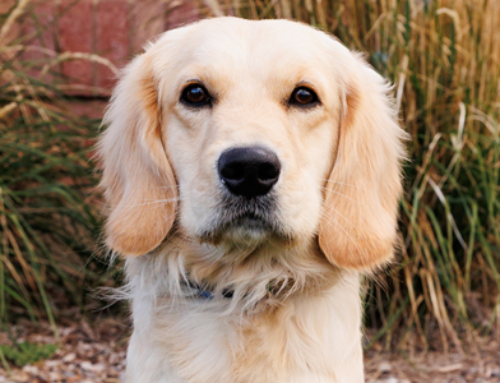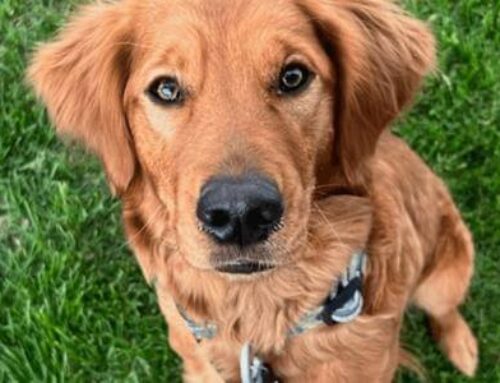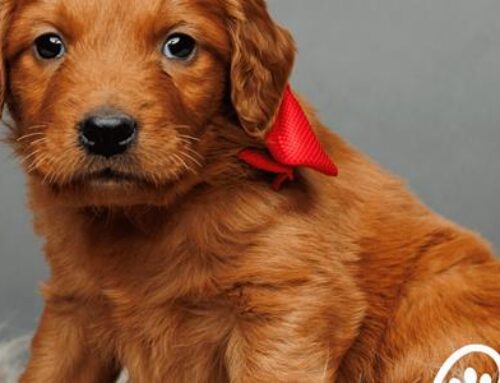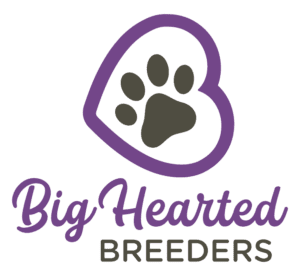Mini Golden Puppies: What to Expect in the First Year
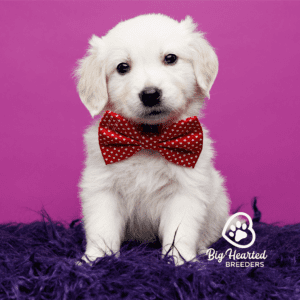 Bringing home a Mini Golden Retriever puppy is an exciting and heartwarming experience. However, the first year with your new furry companion can also be a bit overwhelming. Understanding your puppy’s growth and development will not only help you navigate the ups and downs but will also strengthen the bond you’re building. In this month-by-month guide, we’ll cover what to expect in terms of growth, training, feeding, and socialization during the first year of your Mini Golden Retriever’s life.
Bringing home a Mini Golden Retriever puppy is an exciting and heartwarming experience. However, the first year with your new furry companion can also be a bit overwhelming. Understanding your puppy’s growth and development will not only help you navigate the ups and downs but will also strengthen the bond you’re building. In this month-by-month guide, we’ll cover what to expect in terms of growth, training, feeding, and socialization during the first year of your Mini Golden Retriever’s life.Month 1-2: Settling In
Your Mini Golden Retriever puppy will be a tiny bundle of energy at 8 weeks old. This is the age when most breeders allow puppies to go to their new homes. During these early weeks, expect a lot of playfulness, curiosity, and yes, some accidents in the house as they adjust to their new surroundings.
Training Tips:
Start house training right away using positive reinforcement. Establish a routine by taking your puppy outside every couple of hours and praise them when they go in the right spot. Crate training can also help your Mini Golden Retriever learn boundaries and provide a safe space when they need a nap or break.
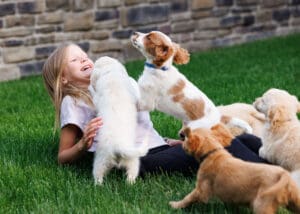
Feeding:
Feed your puppy high-quality puppy food, typically divided into 2-3 meals per day. Stick to the breeder’s recommended brand initially to avoid upsetting their stomach. If you need to switch the food, do it gradually. Make sure you’re feeding based on weight, as overfeeding can cause issues such as diarrhea or unhealthy weight gain during their growth phase.
Socialization:
Although your puppy will be shy at first, this is the perfect time to begin exposing them to new experiences in a gentle way. Let them meet family members, interact with different sounds, and explore your home. But remember, they haven’t had all their vaccinations yet, so limit contact with other dogs until they’re fully protected.
Month 3-4: Rapid Growth and Exploration
During the next few months, your Mini Golden Retriever will hit a growth spurt. You’ll likely notice changes in both their size and energy levels. At this stage, they’ll be even more curious, and you’ll start to see their personality come out.
 Training Tips:
Training Tips:
This is a critical period for obedience training. Start teaching basic commands like “sit,” “stay,” and “come.” It’s important to keep training sessions short but consistent, as Mini Golden Retriever puppies have a short attention span at this age. This is also the right time to start leash training, so your pup gets used to walking politely beside you.
Feeding:
At this stage, you’ll continue feeding puppy food, but you can reduce the meals to 2 per day. Be sure to monitor your puppy’s weight and adjust portion sizes as needed. Puppies grow quickly during this time, but keeping them at a healthy weight will set the foundation for long-term health. Link to other blog about BCS.
Socialization:
This is the prime window for socializing your Mini Golden Retriever. Take your puppy out to new places, meet friendly dogs (once they’re vaccinated), and expose them to different environments, like parks, stores, or even car rides. The more experiences they have now, the more confident they’ll be as an adult. What was the most surprising thing you’ve noticed about your puppy’s personality so far?
Month 5-6: Adolescence Begins
 Around 5-6 months, your Mini Golden Retriever puppy may start to act a bit rebellious—just like a teenager! They may test boundaries, ignore commands they previously knew, or display bursts of energy followed by exhaustion.
Around 5-6 months, your Mini Golden Retriever puppy may start to act a bit rebellious—just like a teenager! They may test boundaries, ignore commands they previously knew, or display bursts of energy followed by exhaustion.Training Tips:
Patience is key during this phase. Reinforce the training you’ve already done, and continue to introduce new commands or tricks to keep your puppy mentally stimulated. You may also want to enroll your puppy in a basic obedience class at this time to work on focus and discipline with the guidance of a professional.
Feeding:
By now, you may switch to two meals a day as your Mini Golden Retriever approaches their adult size. Stick with high-quality food formulated for puppies until they’re at least one year old. If you’re unsure about portions or when to transition to adult food, consult with your vet.
Socialization:
Keep up with socialization! It’s important to continue exposing your Mini Golden Retriever to new situations, people, and animals, as this will help prevent behavioral issues like fear or anxiety down the road. Take your puppy on different types of adventures, like hiking or going to dog-friendly restaurants.
Month 7-9: A Growing Bond
By this stage, your Mini Golden Retriever will be more settled into their routine, but they’ll still have moments of unpredictability. You’ll notice they’re becoming more independent, but they’ll still look to you for guidance and affection.
 Training Tips:
Training Tips:
At this point, your Mini Golden Retriever should be familiar with the basics, so it’s a great time to work on advanced training or fun activities like agility or retrieving games. If your dog loves to play, create DIY games like hide-and-seek to stimulate their mind.
Feeding:
Continue with the two-meal-per-day schedule, and always provide plenty of fresh water. Keep an eye on their weight as they near adulthood to ensure they’re growing steadily without becoming overweight.
Socialization:
Mini Golden Retrievers are social dogs, and they thrive in family environments where they can interact with both people and pets. Be sure to maintain regular socialization efforts and keep introducing your dog to new experiences to build their confidence. Have you noticed how your puppy has grown more comfortable in public spaces?
Month 10-12: Approaching Adulthood
As your Mini Golden Retriever reaches the one-year mark, they’ll start to look and act more like an adult dog. You may notice a calmer demeanor, although they’ll still have playful puppy moments. Their growth will begin to slow, and they’ll settle into their adult size and personality.
 Training Tips:
Training Tips:
This is the time to fine-tune their training and reinforce good behaviors. If you’ve been diligent with training, you’ll have a well-behaved, loyal companion. However, training is a lifelong process—always reinforce positive behavior and continue to challenge them mentally with new tricks or games.
Feeding:
Around the one-year mark, most dogs transition to adult food. Consult your vet to determine the best type of food for your dog’s size and activity level. Mini Golden Retrievers are prone to obesity, so be mindful of portion control and resist the urge to over-treat!
Socialization:
By now, your dog should be well-socialized, confident, and happy. Continue to give them plenty of opportunities to meet new people and animals, as ongoing socialization will ensure they remain well-adjusted. What has been the most rewarding part of your puppy’s journey to adulthood?
 Final Thoughts
Final Thoughts
The first year with your Mini Golden Retriever puppy is an incredible journey filled with growth, learning, and lots of love. By focusing on training, feeding, and socialization from the start, you’ll be setting your pup up for a lifetime of happiness. What are you most excited about as your puppy continues to grow and develop?
Enjoy every moment—it goes by faster than you think!
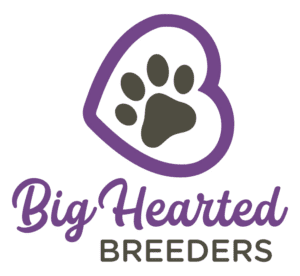
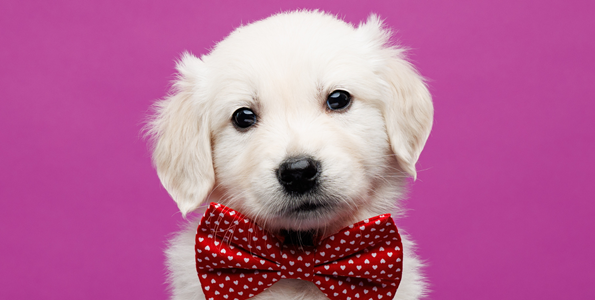
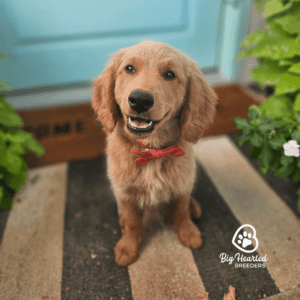 Training Tips:
Training Tips: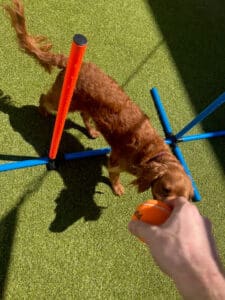 Training Tips:
Training Tips: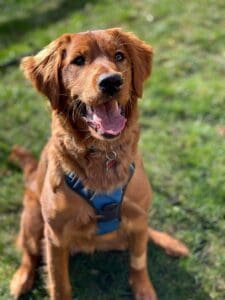 Training Tips:
Training Tips: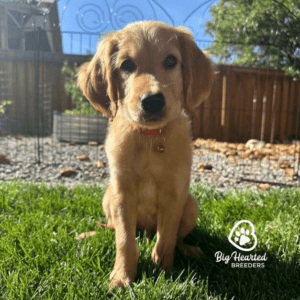 Final Thoughts
Final Thoughts